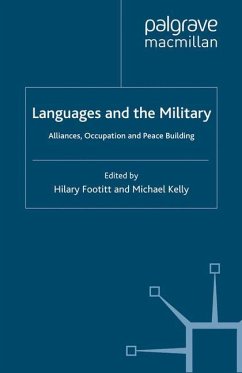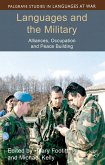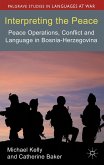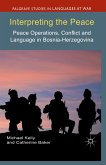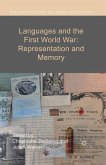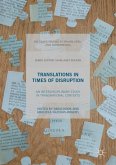Languages and the Military
Alliances, Occupation and Peace Building
Herausgegeben:Footitt, Hilary; Kelly, M.
Languages and the Military
Alliances, Occupation and Peace Building
Herausgegeben:Footitt, Hilary; Kelly, M.
- Broschiertes Buch
- Merkliste
- Auf die Merkliste
- Bewerten Bewerten
- Teilen
- Produkt teilen
- Produkterinnerung
- Produkterinnerung
Through detailed case studies ranging from the 18th century until today,this book explores the role of foreign languages in military alliances, in occupation and in peace building. It brings together academic researchers and practitioners from the museum and interpreting worlds and the military.
Andere Kunden interessierten sich auch für
![Languages and the Military Languages and the Military]() Languages and the Military75,99 €
Languages and the Military75,99 €![WarTalk WarTalk]() Hilary FootittWarTalk75,99 €
Hilary FootittWarTalk75,99 €![WarTalk WarTalk]() Hilary FootittWarTalk75,99 €
Hilary FootittWarTalk75,99 €![Interpreting the Peace Interpreting the Peace]() Michael KellyInterpreting the Peace38,99 €
Michael KellyInterpreting the Peace38,99 €![Interpreting the Peace Interpreting the Peace]() Catherine BakerInterpreting the Peace38,99 €
Catherine BakerInterpreting the Peace38,99 €![Languages and the First World War: Representation and Memory Languages and the First World War: Representation and Memory]() Languages and the First World War: Representation and Memory38,99 €
Languages and the First World War: Representation and Memory38,99 €![Translations In Times of Disruption Translations In Times of Disruption]() Translations In Times of Disruption75,99 €
Translations In Times of Disruption75,99 €-
-
-
Through detailed case studies ranging from the 18th century until today,this book explores the role of foreign languages in military alliances, in occupation and in peace building. It brings together academic researchers and practitioners from the museum and interpreting worlds and the military.
Produktdetails
- Produktdetails
- Palgrave Studies in Languages at War
- Verlag: Palgrave Macmillan / Palgrave Macmillan UK / Springer Palgrave Macmillan
- Artikelnr. des Verlages: 978-1-349-34948-7
- 1st ed. 2012
- Seitenzahl: 264
- Erscheinungstermin: 1. Januar 2012
- Englisch
- Abmessung: 216mm x 140mm x 15mm
- Gewicht: 337g
- ISBN-13: 9781349349487
- ISBN-10: 1349349488
- Artikelnr.: 45081790
- Herstellerkennzeichnung Die Herstellerinformationen sind derzeit nicht verfügbar.
- Palgrave Studies in Languages at War
- Verlag: Palgrave Macmillan / Palgrave Macmillan UK / Springer Palgrave Macmillan
- Artikelnr. des Verlages: 978-1-349-34948-7
- 1st ed. 2012
- Seitenzahl: 264
- Erscheinungstermin: 1. Januar 2012
- Englisch
- Abmessung: 216mm x 140mm x 15mm
- Gewicht: 337g
- ISBN-13: 9781349349487
- ISBN-10: 1349349488
- Artikelnr.: 45081790
- Herstellerkennzeichnung Die Herstellerinformationen sind derzeit nicht verfügbar.
LOUISE ASKEW has been a professional translator, interpreter and reviser working between English and Bosnian/Croatian/Serbian for, amongst others, the International War Crimes Tribunal in The Hague and the NATO Stabilization Force HQ in Sarajevo CATHERINE BAKER Research and Teaching Fellow at the University of Southampton and Teaching Fellow in Nationalism and Ethnic Conflict at University College London, UK CONSTADINA CHARALAMBOUS Lecturer in Language Education and Literacy at the European University of Cyprus MARIA MANUELA FERNANDEZ SANCHEZ Senior Lecturer in the Department of Translation and Interpreting at the University of Granada, Spain LINDA FITCHETT Member of the International Association of Conference Interpreters (AIIC) and coordinator of the Interpreters in Conflict Areas project NICHOLAS FLETCHER has worked in English language teaching, teacher training and project management since 1973 in Italy, UK, Venezuela, China, Romania, Poland, Moldova, Kazakhstan, Mozambique, Colombia and Afghanistan PETER HARE has worked in English language teacher training and project management since the 1990s in Hungary, China, Georgia, Mongolia and, currently, Ethiopia FRANZISKA HEIMBURGER is finishing a PhD at the École des Hautes Études en Sciences Sociales in Paris, France SYLVIE KLEINMAN Historian and translator based in Dublin. She is a Research Fellow at the Centre for War Studies, Trinity College Dublin PEKKA KUJAMAKI Professor of German (Translation and Interpreting) at the Philosophical Faculty, University of Eastern Finland LIEUTENANT COLONEL JUSTIN LEWIS runs the UK Defence Operational Languages Support Unit (DOLSU) as the languages Training Requirement Authority for the UK MOD DIARMAIT MAC GHIOLLA CHRIOST Reader in the School of Welsh, Cardiff University, UK PETRA SVOLJSAK Research counsellor at the Milko Kos Historical Institute of the research Centre of the Slovenian Academy of Sciences and Arts and assistant professor in the department of Cultural History ofthe University of Nova Gorica, Slovenia JAMES TAYLOR Head of Research and Information at the Imperial War Museum, UK SIMONA TOBIA currently teaches Modern European History at the University of Reading, UK CHRISTOPHER TOZZI PhD candidate in the Department of History at Johns Hopkins University in Baltimore, Maryland, USA.
Preface Notes on Contributors Introduction: Languages and the Military: Alliances, Occupation and Peace-Building; H.Footitt One Army, Many Languages: Foreign Troops and Linguistic Diversity in the Eighteenth-Century French Military; C.Tozzi 'Amidst Clamour and Confusion': Civilian and Military Linguists at War in the Franco-Irish Campaigns Against Britain (1792-1804); S.Kleinman Fighting Together: Language Issues in the Military Coordination of First World War Allied Coalition Warfare; F.Heimburger Languages at War: a UK Ministry of Defence Perspective; J.Lewis The Language Policy of the Italian Army in the Occupied Slovenian Territories, 1915-17; P.Svoljsak Mediating for the Third Reich: On Military Translation Cultures in World War II in Northern Finland; P.Kujamäki When Bosnia was a Commonwealth Country: British Forces and Their Interpreters in Republika Srpska, 1995-2007; C.Baker A Bilingual Officer Remembers Korea: a Closer Look at Untrained Interpreters in the Korean War; M.M.F.Sánchez Victims of War: Refugees' First Contacts with the British in the Second World War; S.Tobia Jailtacht: the Irish Language and the Conflict in Northern Ireland; D.M.G.Chríost The AIIC Project to Help Interpreters in Conflict Areas; L.Fitchett Learning the Language of 'The Other' in Conflict-Ridden Cyprus: Exploring Barriers and Possibilities; C.Charalambous Resolving Conflict via English: the British Council's Peacekeeping English Project; P.Hare & N.Fletcher Did Serbo-Croat Die with Yugoslavia?: a Different View of Language and Identity in Bosnia-Herzegovina; L.Askew Exhibiting the 'Foreign' in a National Museum: Imperial War Museum London and Languages at War; J.Taylor Conclusion: Communication, Identity and Representation Through Languages in War; M.Kelly Index
Preface Notes on Contributors Introduction: Languages and the Military: Alliances, Occupation and Peace-Building; H.Footitt One Army, Many Languages: Foreign Troops and Linguistic Diversity in the Eighteenth-Century French Military; C.Tozzi 'Amidst Clamour and Confusion': Civilian and Military Linguists at War in the Franco-Irish Campaigns Against Britain (1792-1804); S.Kleinman Fighting Together: Language Issues in the Military Coordination of First World War Allied Coalition Warfare; F.Heimburger Languages at War: a UK Ministry of Defence Perspective; J.Lewis The Language Policy of the Italian Army in the Occupied Slovenian Territories, 1915-17; P.Svoljsak Mediating for the Third Reich: On Military Translation Cultures in World War II in Northern Finland; P.Kujamäki When Bosnia was a Commonwealth Country: British Forces and Their Interpreters in Republika Srpska, 1995-2007; C.Baker A Bilingual Officer Remembers Korea: a Closer Look at Untrained Interpreters in the Korean War; M.M.F.Sánchez Victims of War: Refugees' First Contacts with the British in the Second World War; S.Tobia Jailtacht: the Irish Language and the Conflict in Northern Ireland; D.M.G.Chríost The AIIC Project to Help Interpreters in Conflict Areas; L.Fitchett Learning the Language of 'The Other' in Conflict-Ridden Cyprus: Exploring Barriers and Possibilities; C.Charalambous Resolving Conflict via English: the British Council's Peacekeeping English Project; P.Hare & N.Fletcher Did Serbo-Croat Die with Yugoslavia?: a Different View of Language and Identity in Bosnia-Herzegovina; L.Askew Exhibiting the 'Foreign' in a National Museum: Imperial War Museum London and Languages at War; J.Taylor Conclusion: Communication, Identity and Representation Through Languages in War; M.Kelly Index
"In Languages and the Military, the editors provide excellent case studies which raise hitherto undiscussed topics. ... A broad range of sources have been used in preparing this volume, including institutional publications and (annual) reports, interviews, parliamentary discussions, documents of state institutions. This breadth makes the book particularly valuable for readers working on similar topics." (Tamara Scheer, European History Quarterly, Vol. 46 (1), 2016)

